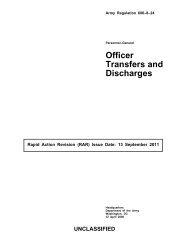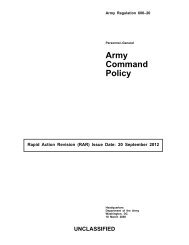Patient Administration - Army Publishing Directorate - U.S. Army
Patient Administration - Army Publishing Directorate - U.S. Army
Patient Administration - Army Publishing Directorate - U.S. Army
You also want an ePaper? Increase the reach of your titles
YUMPU automatically turns print PDFs into web optimized ePapers that Google loves.
(c) SCI patients will be transferred to VA SCI centers before completion of MEBs. Each MTF commander will<br />
establish procedures for the early identification and transfer of SCI patients. The general goal will be to transfer within<br />
3 or 4 days from overseas and in no instance to exceed 12 days past the injury. The GPMRC will provide assistance as<br />
required in accomplishing transfers on a 24-hour basis. When the attending physician determines that the patient’s<br />
transfer category is “URGENT” or “PRIORITY,” the MTF may coordinate directly with the GPMRC, Scott AFB, IL<br />
62225. Early dialogue between the attending physician and a physician at the VA SCI center will be the determining<br />
factor as to the method and time of the patient’s transportability. Every effort will be made to ensure that the patient is<br />
sent to the VA SCI center nearest his or her selected place of residence. SCI patients arriving from overseas will go<br />
directly to the VA treatment facility without passing through an intervening CONUS military hospital.<br />
(5) Careful consideration will be given to the availability and economical use of all Government transportation. Air<br />
Mobility Command routine air evacuation will be used whenever feasible. Arrangements for the transportation of<br />
patients to the VA treatment facility will be made by the <strong>Army</strong> MTF commander. If a patient is moved by means other<br />
than air evacuation, an after-the-fact report will be furnished to GPMRC by electrical message within 48 hours. An<br />
informational copy of the message will be furnished to the MTF having administrative responsibility for an <strong>Army</strong><br />
patient in the particular VA SCI center.<br />
(6) When warranted, an attendant or attendants will accompany the patient during the transfer from the <strong>Army</strong> MTF.<br />
(Attendant, as used here, includes medical personnel assigned to aeromedical evacuation flights.) The attendant will<br />
carry the records and documents listed in (a) through (e) below to the receiving MTF. When no attendant is required,<br />
the patient will carry a properly completed and authenticated copy of VA Form 10-10M. Other pertinent records and<br />
documents listed below will be forwarded by certified mail before the patient’s departure.<br />
(a) DD Form 675 (Receipt for Records and <strong>Patient</strong>s Property) in duplicate. DD Form 675 is available on the APD<br />
Web site (www.apd.army.mil).<br />
(b) VA Form 10-10M. Attach a copy of VA Form 10-10M to VA Form 10-10EZ and enter “see attached summary”<br />
on VA Form 10-10M instead of completing the medical certificate. Only NLD cases will be required to complete items<br />
20 and 21 of VA Form 10-10M. VA forms may be obtained from the field station having jurisdiction.<br />
(c) A copy of the current ITR, including a copy of MEB proceedings.<br />
(d) X ray films, if any.<br />
(e) A duplicate of VA Form 21-526E (Veterans Application for Compensation or Pension) if completed.<br />
(7) When the patient is ready for transfer, advance notification will be made by the most expeditious means<br />
available to the Director, VA treatment facility. It will include the patient’s name, grade, SSN, and any applicable<br />
information regarding the following:<br />
(a) Whether the patient is ambulatory.<br />
(b) Mode of transportation.<br />
(c) Scheduled time and place of arrival.<br />
(d) If accompanied by an attendant, the name and grade of the attendant.<br />
(e) GPMRC cite number.<br />
(8) A request will be included for prompt notification of the hour and date of the patient’s arrival. If delayed, the<br />
attendant will advise the losing <strong>Army</strong> MTF and the director of the receiving VA treatment facility of the change in<br />
scheduled time of arrival and reasons for the change.<br />
(9) When final disposition instructions are received by the <strong>Army</strong> MTF, the receiving VA treatment facility will be<br />
notified of the type and date of disposition.<br />
b. Transfer to a community nursing home under VA contract. When the GPMRCs reply to a request for a nursing<br />
home bed designation indicates that the patient will be transferred to a community nursing home under VA contract,<br />
the location of the VA treatment facility responsible for the patient will be included. Responsibility of the VA<br />
treatment facility includes liaison with GPMRC and the community nursing home and authorization and payment for<br />
nursing home care. It also includes follow-up visits to the community nursing home to evaluate care of the patient, and<br />
submission of reimbursement requests to Commander, USAMEDCOM, ATTN: MCRM-F, 2050 Worth Road, Fort Sam<br />
Houston, TX 78234-6000. (See para 4-5d for disposition of patient’s clothing and valuables when transferred to a<br />
community nursing home.) The provisions of a above apply to patients transferred to a community nursing home under<br />
VA contract except as follows:<br />
(1) The records listed in a(6), above, will be forwarded to the responsible VA treatment facility. That form may be<br />
obtained from the field station having jurisdiction.<br />
(2) SF 502 will be prepared by the <strong>Army</strong> MTF and will accompany the patient to the community nursing home.<br />
c. <strong>Patient</strong>s not eligible for care in a VA treatment facility. For patients not eligible for care in VA treatment<br />
facilities, the commander will initiate action to ensure proper disposition before separation. Disposition of psychiatric<br />
patients will be made under provisions similar to those in paragraph 5-23c. When the NOK will not accept the patient<br />
or provide the required care, the MTF commander will contact the proper civil authorities in the patient’s State of<br />
residence and secure permission to transfer the patient to their custody. If permission is not granted, the commander<br />
will repeat the procedure with the civil authorities of the State from which the patient entered the Service if that State<br />
is different from the State of residence. <strong>Patient</strong>s who do not have psychiatric conditions and are capable of making<br />
44 AR 40–400 27 January 2010
















